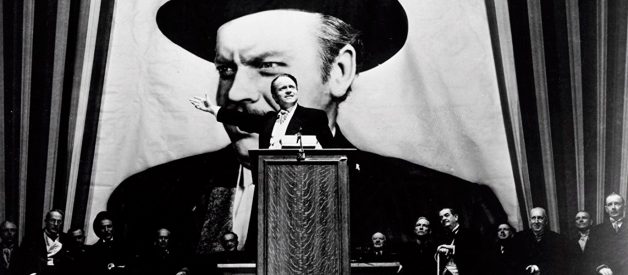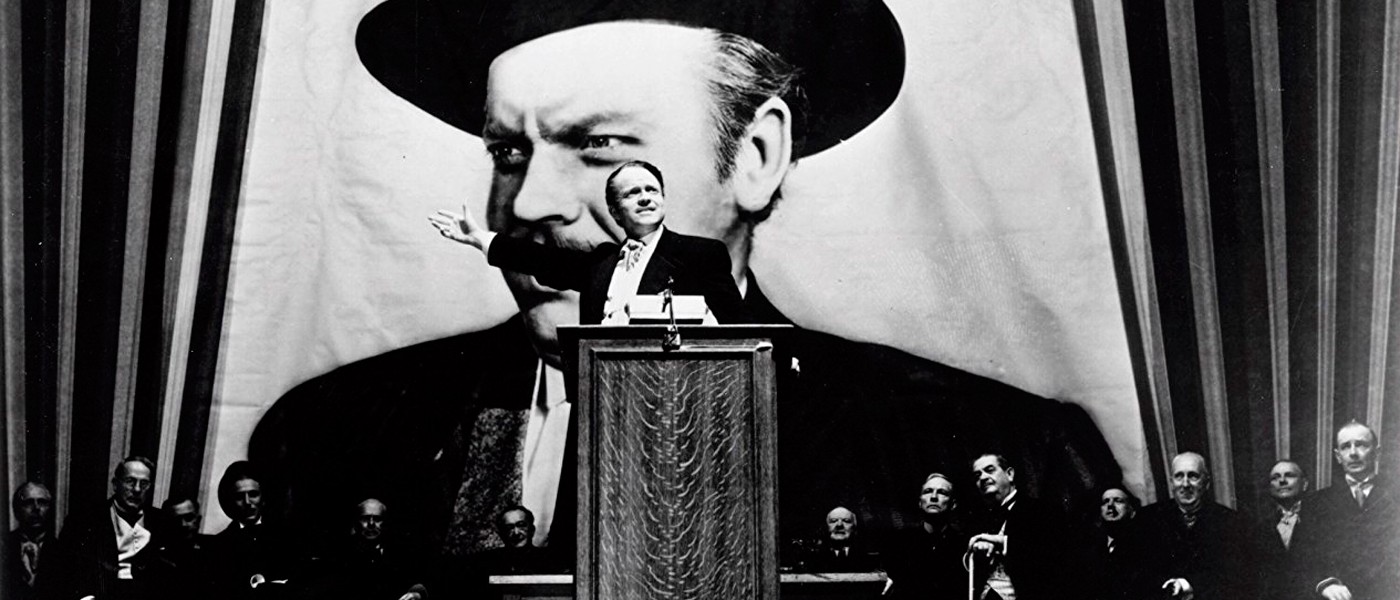 Charles Foster Kane paying tribute to Charles Foster Kane in ?Citizen Kane.? Image: RKO Pictures.
Charles Foster Kane paying tribute to Charles Foster Kane in ?Citizen Kane.? Image: RKO Pictures.
I have a friend who calls himself a movie buff. He will sling quotes from movies or dive into extended monologues about recent films he?s seen. He gets excited for new releases like a kid, and is always looking to compare Netflix queues. It makes for good conversation.
One time I mentioned that I re-watched Casablanca after many years and how I marveled at how many quotable lines were in the film. He returned my observation with a blank look.
How about Double Indemnity? Now there?s a screenplay that crackles with dialogue. He?d never heard of it.
Surely, North by Northwest. I first saw that movie as a kid watching late night TV. It came on, and I was too tired to change the channel. I?ll bet I?ve watched it three dozen times since.
Nope, my friend said, never seen it. Nor any other Alfred Hitchcock films I rattled off.
When I brought up Citizen Kane, he perked up. Finally, I struck gold. Almost. He?d heard of it. But, no, hadn?t seen that one, either.
Turns out my ?movie buff? friend didn?t watch black and white movies. Or pretty much anything made before 1980. Maybe it was a religious thing. I never inquired.
There?s a lot of people who don?t watch ?old? movies. I get it. Modern filmmaking is fast-paced, like life itself. Short scenes with lots of camera shots, special effects, bright colors, big soundtracks, big actors, big everything. Studios make films for a worldwide market now. There?s a lot on the line. When even a romantic comedy can?t be made and marketed for less than $50 million, filmmakers have to pull out all the stops to make a movie sell.
But we?re talking about Citizen Kane here. It is the most critically acclaimed motion picture in history. It is considered by many to be the greatest film ever made.
Every modern filmmaker my friend, or anyone for that matter, enjoys, was influenced by this 1941 masterpiece. If you have seen any of the films of Martin Scorsese, Francis Coppola, Woody Allen, Stanley Kubrick, Paul Schrader, Richard Linklater, Paul Thomas Anderson, Sam Mendes, Alex Cox, Roger Corman, or countless others, then you should take a peek at Citizen Kane.
Not convinced? Too tough a sell?
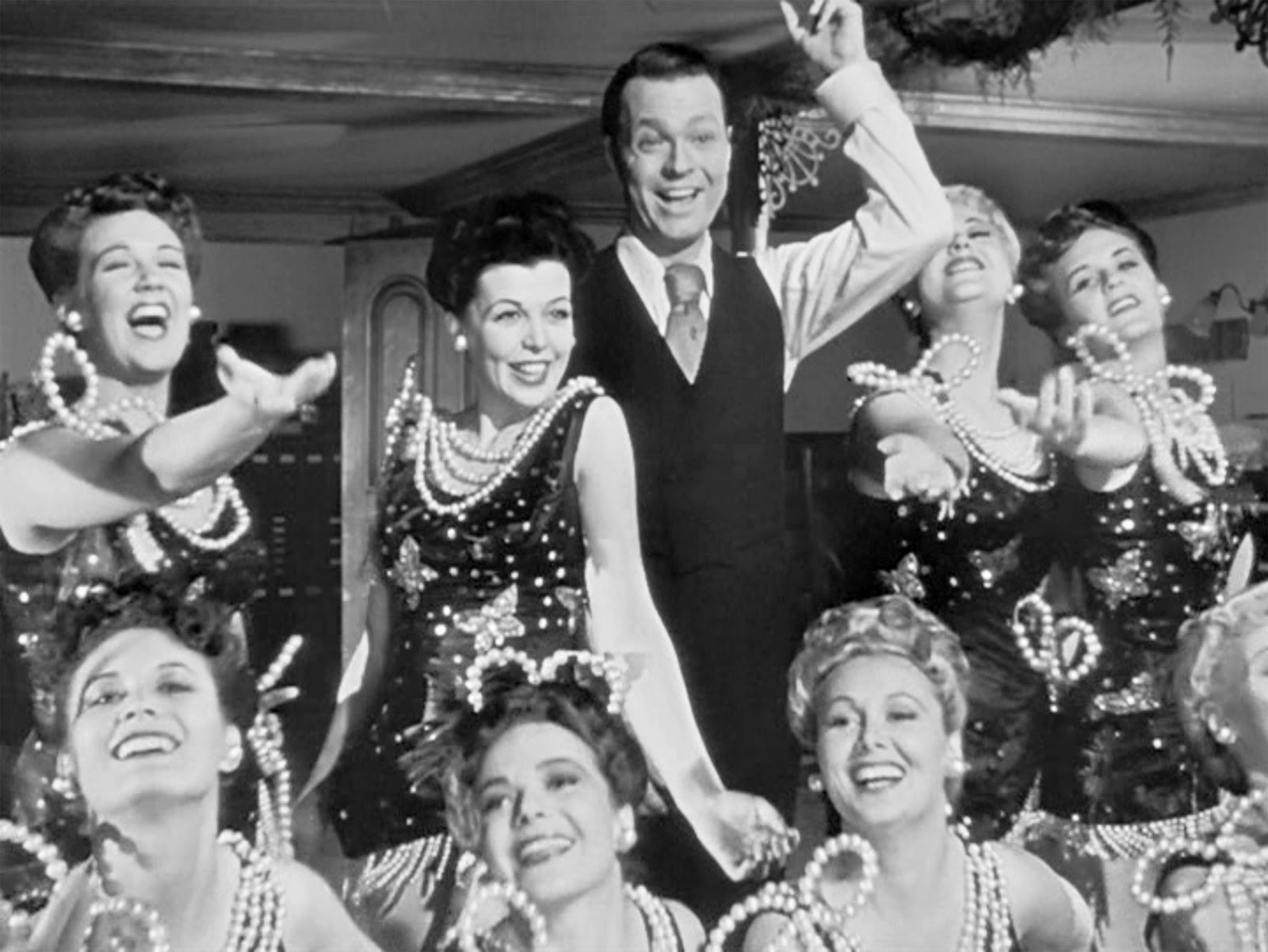 It?s got showgirls. Everybody likes showgirls. Image: RKO Pictures.
It?s got showgirls. Everybody likes showgirls. Image: RKO Pictures.
I?ve heard the arguments before. Why should you care about a movie that was made almost 80 years ago, right? It has long scenes with lots of dialogue. It?s in black and white. The acting, by modern standards, is stiff and melodramatic. It is rooted in old-world ideas and sensibilities. Virtually everyone who acted in the film, worked on it, or was associated with its original release in any way is dead. The film has no living connection to our modern world.
Nuts to all that, I say.
If you enjoy films that tell a compelling story, films that use lighting and cinematography to enhance how that story is told, a screenplay that flawlessly lays out a compelling non-linear narrative, a punctuated musical score that is in itself a character in the story, then you will enjoy Citizen Kane.
When Kane?s creator Orson Welles came to Hollywood in 1939, he was a young kid with a dream. The twenty-four-year-old artist had already made a name for himself with his Mercury Theatre radio and stage dramas. His Halloween 1938 radio drama of War of the Worlds became famous for supposedly causing a panic in the American countryside.
RKO Pictures, one of the big Hollywood players of the time, signed Welles to a movie contract that gave him unprecedented control, including the freedom to create and adapt his own material, final cut, the works. Other studios were upset at the deal because they knew their own talent would be calling for the same perks before too long.
Welles first wanted to adapt Joseph Conrad?s Heart of Darkness, which Mercury had produced as a radio play. But the unconventional manner that he proposed for making the film ? including lots of handheld shots and first-person narrative ? proved unworkable. (If you want to read about how another great filmmaker adaptated Heart of Darkness, then check this out.)
Welles hooked up with screenwriter Herman Mankiewicz, and together they came up with a story about Charles Foster Kane, a megalomaniacal media mogul. Their screenplay tracked his life from humble beginnings in late 19th century Colorado through to immense corporate and political power to his lonely fall from grace.
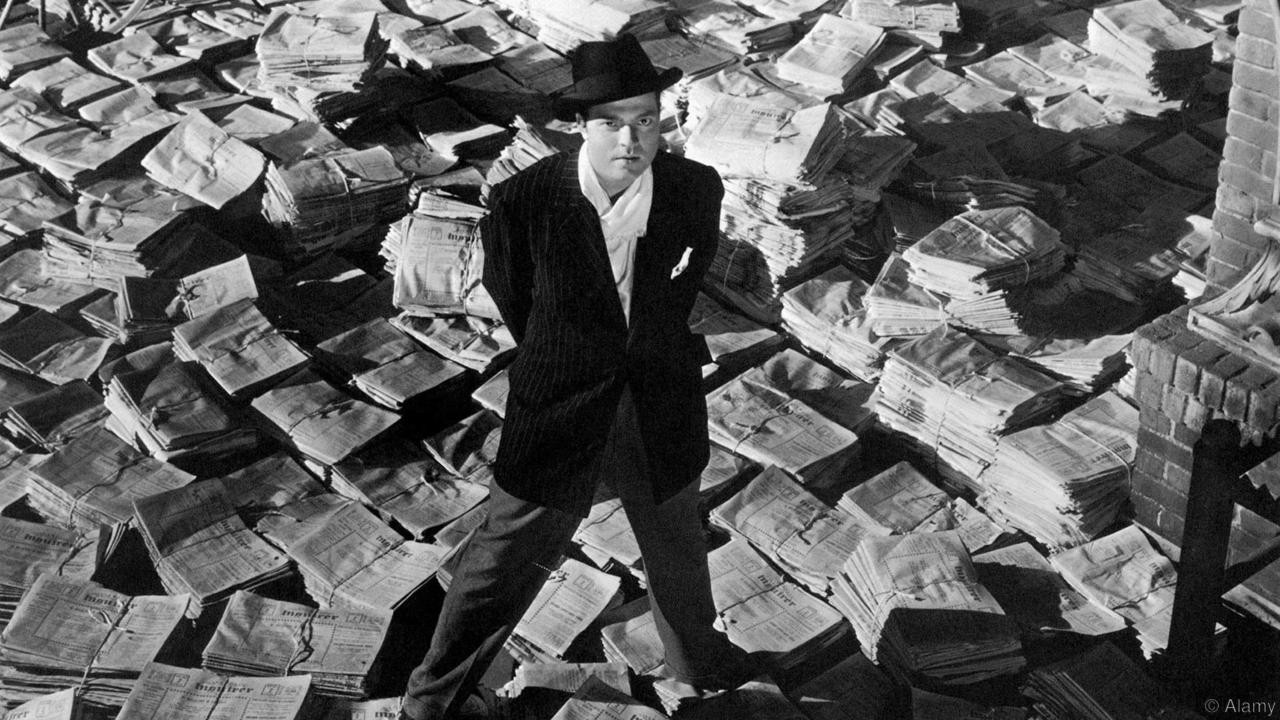 Kane stands astride his world like a colossus. Image: RKO Picutres.
Kane stands astride his world like a colossus. Image: RKO Picutres.
The scope of the story is quite broad, but the writers cleverly used a non-linear narrative to squeeze 80 years of life into two hours. The film opens with Kane, played by Welles, on his dying bed. The last word he utters before giving up the ghost is ?rosebud.? What can it mean?
A reporter is assigned to find out. (This is the only real hole in this otherwise perfect film. When Kane says his last words, he is alone in his bedroom. So, how does a reporter or his editor know what Kane said? Simple answer: who cares.)
The reporter then tracks down all the people from Kane?s life. Through his interviews we are treated to a series of carefully woven flashbacks that piece together the story of Kane. We see how his well-intentioned desire to use his newspaper to root out corruption mutates into a desire not only to tell the news, but to control it and influence events.
Citizen Kane broke new ground across many fronts to tell its story. Welles had never directed a film before, but he taught himself cinematography by watching the films of John Ford and others. He was diligent about blocking shots, and his almost obsessive preparation meant that every time he stepped on set, he knew what he wanted to accomplish, even if it was something that had never been done before.
Most of the actors, including Welles, had never appeared in motion pictures. But they were all veterans of the Mercury Theatre, so they were comfortable working with each other. Welles was also very keen on rehearsing before shooting, something that was not very common in those days. It helped sharpen the scenes and sometimes led to script enhancements that improved the story.
Makeup techniques were applied and invented to age the actors across many years. No other film prior to Kane had used makeup effects to such a great degree on so many major characters.
The musical score by Bernard Herrmann was also groundbreaking in its depth and orchestration. Film scores were often used to bookend movies and add some punch to dramatic scenes, but with Kane, Welles wanted the music to be a part of the film. Herrmann, who would later achieve legendary status working with Alfred Hitchcock and other directors, was given the freedom and time to create separate musical pieces for specific scenes, rather than a complete orchestral score for the entire film as was customary.
The look of the film may be its most dazzling achievement. Cinematographer Gregg Toland was eager to work with Welles. He believed that the first-time director, who already had a reputation for breaking rules on stage, would come to the set with ideas that traditional Hollywood filmmakers would never think of or have the courage to attempt.
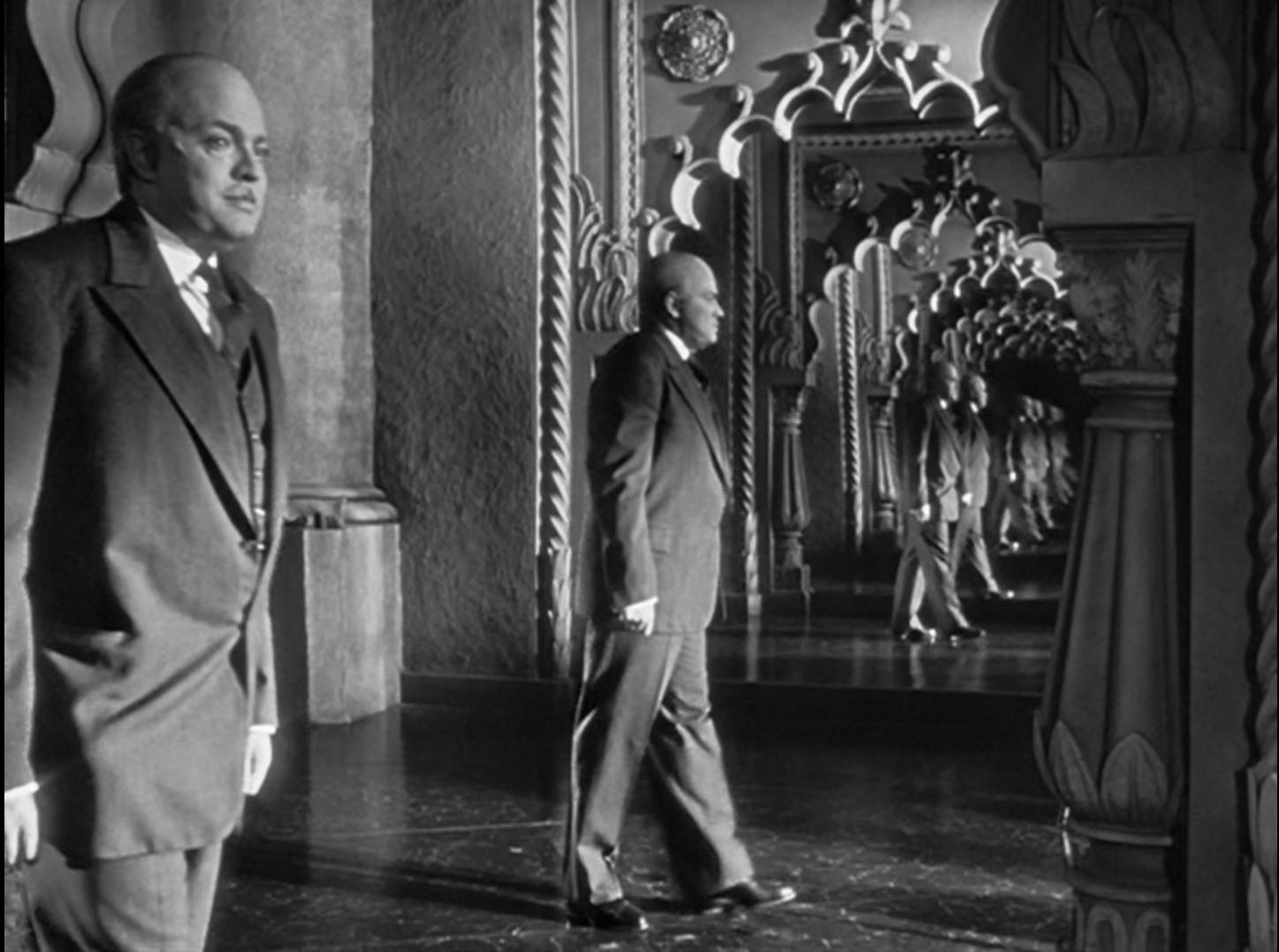 The cinematography of ?Citizen Kane? greatly influenced how movies were shot. Image: RKO Studios.
The cinematography of ?Citizen Kane? greatly influenced how movies were shot. Image: RKO Studios.
Together they experimented with light and shadow, deep focus, and camera angles to tell Kane?s story. Some of these techniques had never been tried before, and those that had were not applied nearly as effectively as in Kane.
Citizen Kane was critically well-received when it was released on May 1, 1941. Public reception was a little more tepid. Some credit William Randolph Hearst?s war against Welles for this. Hearst, a real-life megalomaniacal media mogul, felt the film hit a little too close to home. He banned any advertising or mention of Kane in any of his papers, and he tried to muscle RKO into shelving the picture.
While Hearst may have quieted the film?s public reach to some degree, the real reason that it had a lukewarm box office response may have been due more to the fact that Kane employed a number of filmmaking techniques that were foreign to moviegoers at the time. It was ?arthouse? before arthouse was a thing. Yet another first for Citizen Kane.
But don?t let that keep you from seeing this movie if you never have. Citizen Kane is a timeless story about absolute power corrupting absolutely. We all love that stuff. And it is told in a way that uses the best techniques that cinema has to offer, then or now.
Citizen Kane is still, and will always be, movie magic at its finest.
I?d like to hear your comments. Send them along. And please be sure to check out my other articles on Medium and at my website. Cheers!
